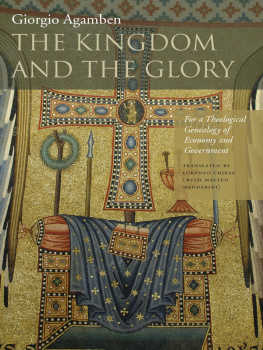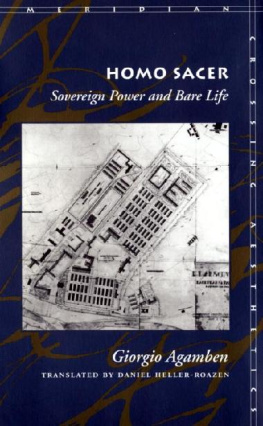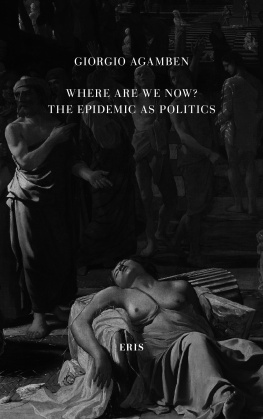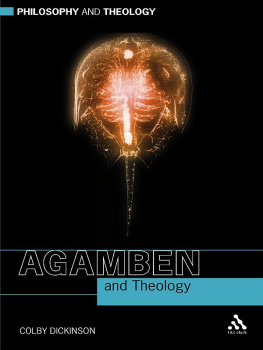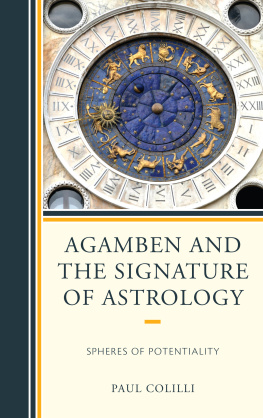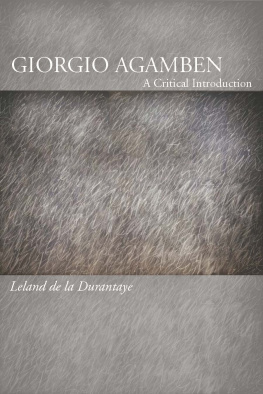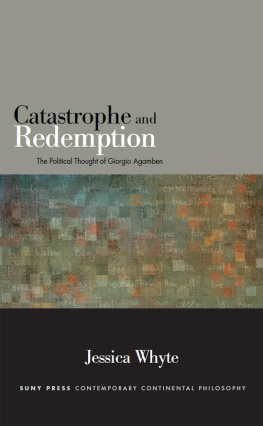Giorgio Agamben - Means Without End: Notes On Politics
Here you can read online Giorgio Agamben - Means Without End: Notes On Politics full text of the book (entire story) in english for free. Download pdf and epub, get meaning, cover and reviews about this ebook. year: 2000, publisher: University of Minnesota Press, genre: Science / Politics. Description of the work, (preface) as well as reviews are available. Best literature library LitArk.com created for fans of good reading and offers a wide selection of genres:
Romance novel
Science fiction
Adventure
Detective
Science
History
Home and family
Prose
Art
Politics
Computer
Non-fiction
Religion
Business
Children
Humor
Choose a favorite category and find really read worthwhile books. Enjoy immersion in the world of imagination, feel the emotions of the characters or learn something new for yourself, make an fascinating discovery.

- Book:Means Without End: Notes On Politics
- Author:
- Publisher:University of Minnesota Press
- Genre:
- Year:2000
- Rating:5 / 5
- Favourites:Add to favourites
- Your mark:
- 100
- 1
- 2
- 3
- 4
- 5
Means Without End: Notes On Politics: summary, description and annotation
We offer to read an annotation, description, summary or preface (depends on what the author of the book "Means Without End: Notes On Politics" wrote himself). If you haven't found the necessary information about the book — write in the comments, we will try to find it.
Means Without End: Notes On Politics — read online for free the complete book (whole text) full work
Below is the text of the book, divided by pages. System saving the place of the last page read, allows you to conveniently read the book "Means Without End: Notes On Politics" online for free, without having to search again every time where you left off. Put a bookmark, and you can go to the page where you finished reading at any time.
Font size:
Interval:
Bookmark:



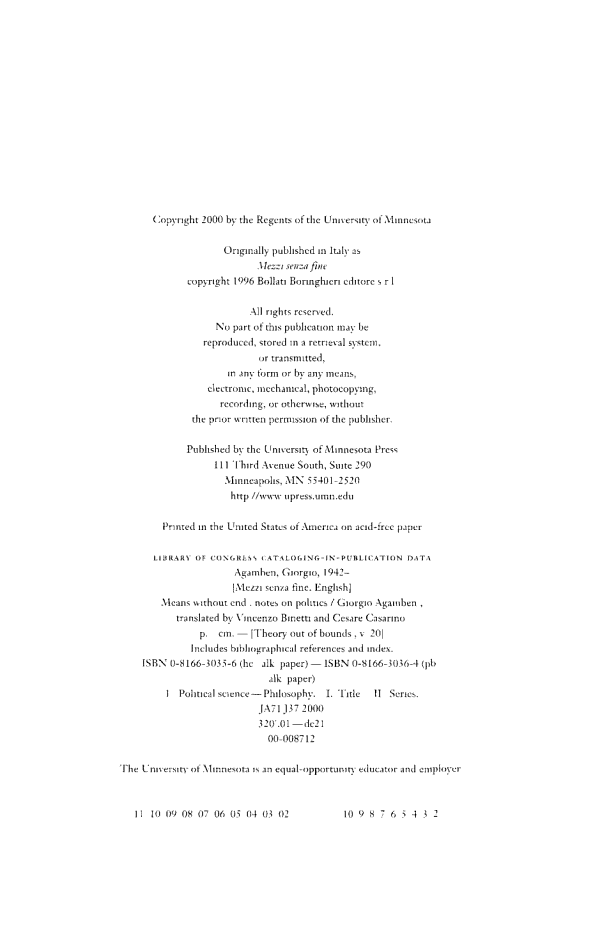
Guy Debord
in memoriam
Preface
Each Of the texts included in this volume attempts in its own way to think specific political problems. If politics today seems to be going through a protracted eclipse and appears in a subaltern position with respect to religion, economics, and even the law, that is so because, to the extent to which it has been losing sight of its own ontological status, it has failed to confront the transformations that gradually have emptied out its categories and concepts. Thus, in the following pages, genuinely political paradigms are sought in experiences and phenomena that usually are not considered political or that are considered only marginally so: the natural life of human beings (that zoe that was once excluded from properly political spheres and that, according to Foucault's analysis of biopolitics, has now been restored to the center of the polis); the state of exception (that tempo rary suspension of the rule of law that is revealed instead to constitute the fundamental structure of the legal system itself); the concentration camp (a zone of indifference between public and private as well as the hidden matrix of the political space in which we live); the refugee, formerly regarded as a marginal figure, who has become now the decisive factor of the modern nation-state by breaking the nexus between human being and citizen; language, whose hypertrophy and expropriation define the politics of the spectacular-democratic societies in which we live; and the sphere of gestures or pure means (that is, the sphere of those means that emancipate themselves from their relation to an end while still remaining means) posited as the proper sphere of politics.
All these texts refer, in various ways and according to the circumstances in which they were born, to investigations that are still open. At times they anticipate the original nuclei of those investigations and at others they present fragments and shards. (The first product of such investigations is the book titled Homo Sacer.) As such, these texts are destined to find their true sense only within the perspective of the completed work, that is, only within a rethinking of all the categories of our political tradition in light of the relation between sovereign power and naked life.1
PART I
ONE
Form-off-Liffe
THE ANCIENT Greeks did not have only one term to express what we mean by the word life. They used two semantically and morphologically distinct terms: zoe, which expressed the simple fact of living common to all living beings (animals, humans, or gods), and bios, which signified the form or manner of living peculiar to a single individual or group. In modern languages this opposition has gradually disappeared from the lexicon (and where it is retained, as in biology and zoology, it no longer indicates any substantial difference); one term onlythe opacity of which increases in proportion to the sacralization of its referentdesignates that naked presupposed common element that it is always possible to isolate in each of the numerous forms of life.
By the term fonn-of-life, on the other hand, I mean a life that can never be separated from its form, a life in which it is never possible to isolate something such as naked life.
A life that cannot be separated from its form is a life for which what is at stake in its way of living is living itself. What does this formulation mean? It defines a life human life in which the single ways, acts, and processes of living are never simply facts but always and above all possibilities of life, always and above all power.1 Each behavior and each form of human living is never prescribed by a specific biological vocation, nor is it assigned by whatever necessity; instead, no matter how customary, repeated, and socially compulsory, it always retains the character of a possibility; that is, it always puts at stake living itself. That is why human beings as beings of power who can do or not do, succeed or fail, lose themselves or find themselves are the only beings for whom happiness is always at stake in their living, the only beings whose life is irremediably and painfully assigned to happiness. But this immediately constitutes the form-of-life as political life. "Civitatem... communitatem esse institutam propter vivere et bene vivere hominum in ea" [The state is a community instituted for the sake of the living and the well living of men in it].2
Political power as we know it, on the other hand, always founds itselfin the last instance on the separation of a sphere of naked life from the context of the forms of life. In Roman law, vita [life] is not a juridical concept, but rather indicates the simple fact of living or a partic ular way of life. There is only one case in which the term life acquires a juridical meaning that transforms it into a veritable terminus technicus, and that is in the expression vitae necisque potestas, which designates the pater's power of life and death over the male son. Yan Thomas has shown that, in this formula, que does not have disjunctive function and vita is nothing but a corollary of nex, the power to kill.3
Thus, life originally appears in law only as the counterpart of a power that threatens death. But what is valid for the pater's right of life and death is even more valid for sovereign power (imperium), of which the former constitutes the originary cell. Thus, in the Hobbesian foundation of sovereignty, life in the state of nature is defined only by its being unconditionally exposed to a death threat (the limitless right of everybody over everything) and political life that is, the life that unfolds under the protection of the Leviathanis nothing but this very same life always exposed to a threat that now rests exclusively in the hands of the sovereign. The puissance absolue et perpetuelle, which defines state power, is not founded in the last instance on a political will but rather on naked life, which is kept safe and protected only to the degree to which it submits itself to the sovereign's (or the law's) right of life and death. (This is precisely the originary meaning of the adjective sacer [sacred] when used to refer to human life.) The state of exception, which is what the sovereign each and every time decides, takes place precisely when naked lifewhich normally appears rejoined to the multifarious forms of social lifeis ex plicitly put into question and revoked as the ultimate foundation of political power. The ultimate subject that needs to be at once turned into the exception and included in the city is always naked life.
"The tradition of the oppressed teaches us that the 'state of emergency' in which we live is not the exception but the rule. We must attain to a conception of history that is in keeping with this insight."4 Walter Benjamin's diagnosis, which by now is more than fifty years old, has lost none of its relevance. And that is so not really or not only because power no longer has today any form of legitimization other than emergency, and because power everywhere and continuously refers and appeals to emergency as well as laboring secretly to produce it. (Howcould we not think that a system that can no longer function at all except on the basis of emergency would not also be interested in preserving such an emergency at any price?) This is the case also and above all because naked life, which was the hidden foundation of sovereignty, has meanwhile become the dominant form of life everywhere. Life in its state of exception that has now become the norm is the naked life that in every context separates the forms of life from their cohering into a form-of-life. The Marxian scission between man and citizen is thus superseded by the division between naked life (ultimate and opaque bearer of sovereignty) and the multifarious forms of life abstractly recodified as socialjuridical identities (the voter, the worker, the journalist, the student, but also the HIV-positive, the transvestite, the porno star, the elderly, the parent, the woman) that all rest on naked life. (To have mistaken such a naked life separate from its form, in its abjection, for a superior principle sovereignty or the sacred is the limit of Bataille's thought, which makes it useless to us.)
Font size:
Interval:
Bookmark:
Similar books «Means Without End: Notes On Politics»
Look at similar books to Means Without End: Notes On Politics. We have selected literature similar in name and meaning in the hope of providing readers with more options to find new, interesting, not yet read works.
Discussion, reviews of the book Means Without End: Notes On Politics and just readers' own opinions. Leave your comments, write what you think about the work, its meaning or the main characters. Specify what exactly you liked and what you didn't like, and why you think so.

